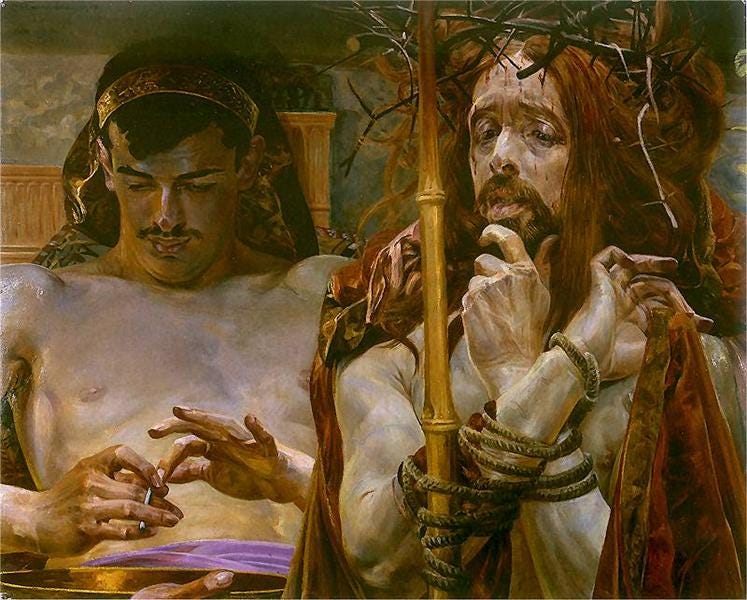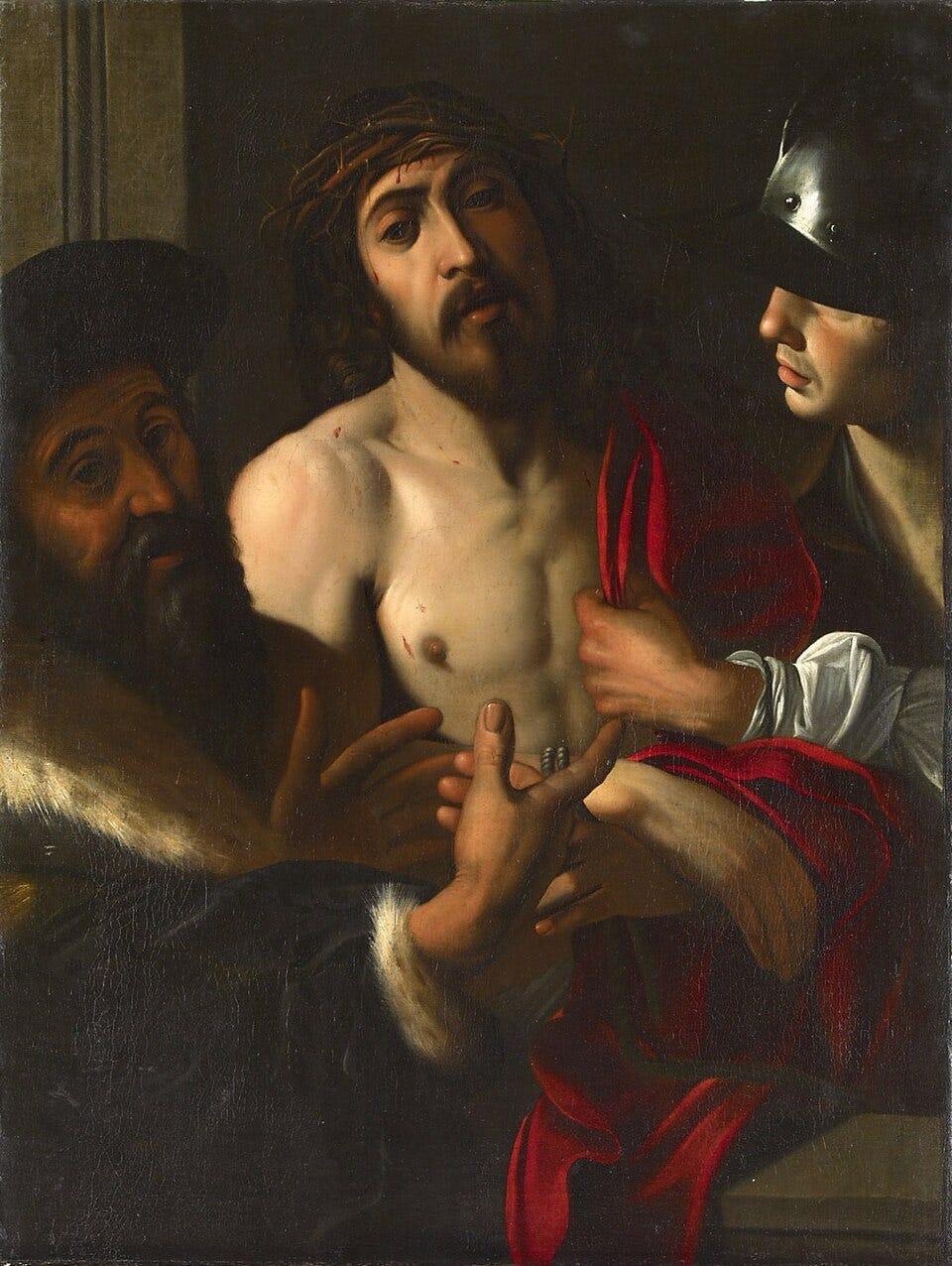Audio Post:
The slow walk through Jesus’ passion can be excruciating. One might wonder if this is necessary. There are plenty of things to occupy our minds in our spiritual journey that does not require us to spend so much time contemplating Jesus’ sorrow and suffering. I am sympathetic to those arguments. And yet a significant amount of space is given in each of the Gospel accounts to these few days in Jesus’ life and I can’t help but wonder if that alone makes it extremely important to spend time here. There is much to contemplate.
The cross is, of course, central to our faith. No one would deny that. But I grew up in a tradition that tended to see the cross primarily as the place of victory over sin and give rather short shrift to what this journey of Jesus reveals about the nature of the God we serve. Paul, in writing to the Corinthians, was at pains to remind the Christians there that they worship a crucified Messiah, emphasis on the crucified. As we continue to accompany Jesus approaching the cross, may we have ears to hear what the Spirit is saying to us.
Jesus Remains Silent
Jesus is brought out of the chambers of the Sanhedrin, accused and convicted, and taken to the Roman governor Pilate. Death was the only possibility for this blasphemer. The chief priests and teachers of the law knew they were unable to put Jesus to death on their own. They needed the Roman authorities to carry this out.
Jesus soon stands before Pilate, likely bruised and disheveled from the blows he has received. “Are you the King of the Jews?” Pilate asks. How is it that he knew to ask this question? The chief priests have prepared him, no doubt. They are partnering with their sworn enemies, their Roman overlords - Gentiles, no less - to carry out their diabolical desires. Amazing what we’ll do to carry out our schemes.
Jesus confirms this, his identity, and then goes silent once again. The chief priests and elders continue to accuse him, to the point where Pilate asks Jesus directly, “Don’t you hear what they’re saying about you? Aren’t you going to respond to these charges?”
Jesus will not defend himself. He will not try to prove his identity, his kingship, to these accusers. His silence forces them to make their own choice. He will not offer them a reasoned argument to weigh the pros and cons. “Look at me, and decide,” I imagine him saying.
I am reminded of Jesus’ question to his disciples earlier, “Who do people say that I am? And you? What do you say?” Jesus honors them enough to come to their own conclusions. They have seen and heard enough. What do you say?
Jesus allows us to come to our own conclusions about him. He will acknowledge his identity, but he will not try to prove it. He will not be tested by us. He will not yield to the veiled temptation of the enemy, “If you are the Son of God . . . do thus and so.” He is not interested in debates, and arguments, and theoretical conclusions. In Luke, we read Jesus saying, “If I tell you, you will not believe me.” Jesus knows well the human heart. In his silence, he puts it back on them, and us, to choose.
Choosing Barabbas
And they do choose. It is a custom for the Roman governor to release a prisoner at the Passover feast. Hoping that the crowd will choose to release the innocent Jesus rather than the guilty and murderous Barabbas, (also named Jesus – Jesus Barabbas, interestingly) Pilate gives them a choice. Jesus will not defend himself or give a case for his release but surely the people will choose the innocent over the guilty. He is wrong about that.
In choosing Barabbas, the people are choosing death rather than life, violence rather than love, armed rebellion rather than yielded surrender. Being on Jesus’ “side” so to speak, of course we want Jesus spared rather than the murderous Barabbas. But the Gospel writers are wanting us to see ourselves in this crowd, and this choice. They describe Barabbas as guilty of “insurrection and murder.” He represents not simply a prisoner who has a lucky day, but a way of being in the world, a way of strength, of power, of unwillingness to be wronged, of fighting for our own way.[1] This is exactly the same instinct that Peter showed in Gethsemane while swinging his sword. This is the impulse within each of us who would rather strike out than be struck, curse our enemies rather than bless them, blame our adversaries rather than forgive them.
We stand in shock as the crowd chooses a murderer over Jesus. But that is the choice we are all likely to make, not in such blatant terms as this, but in all the tiny insurrections in our own hearts. This becomes even more clear when the crowd begins shouting “Crucify him” with gusto. In some theatrical presentations of Christ’s Passion, the audience is prompted to shout out “Crucify him” at this point in the story. I’ve never been in such an audience, and I don’t think I could say those words, but I have heard the testimony of people who took on the role of the crowd in a small reenactment of this scene and the devastation they felt having to say this. As we talked about it further, there was the slow recognition that there was within them something that resonated with this cry. They were surprised at the ease with which they could utter these words. Even those of us who love Jesus would do well to pray those parts of our hearts that would rather see Jesus set aside than to yield to his authority. “Not my will but yours” can be a difficult prayer to pray.
Jesus Crowned King
Once again, though, I remind myself to return to Jesus. This story is not about us. When we are tempted to get lost in our own guilt, or our resistance to feeling guilty, we return to Jesus.
Jesus responds affirmatively to the questions, “Are you the Messiah? Are you the King?” It is the only thing that breaks his silence. This leads the soldiers to present their own mock coronation ceremony. They create a crown of thorns and shove it on his head. They put a scarlet robe on his bloodied body and a royal scepter in his hand. They proceed to bow down to him, “Hail, king of the Jews” in mock allegiance.
And the gifts they offer? When Jesus was born, emissaries from the wider world brought him gold, frankincense and myrrh, gifts fit for a king. Now, these emissaries of the world bring him different gifts, fit, as they see it, for this king - blows to his head, spittle on his face, and whip marks on his back. Jesus received those first gifts all those years ago. Now he stands and receives all of this. Can I follow a king who allows this to happen? Can I bow down to a king who receives the mocking laughter of the world? With each dehumanizing degradation, Jesus stands and remains silent, What was he thinking, I wonder? Was he remembering his prayer in Gethsemane? Was he remembering his own teaching on the Mountain?
“Not my will but yours be done, Father.” Lord, have mercy on us all.
This scene is a difficult place to remain with Jesus. How is the Spirit inviting you to be with him? We often pray and ask Jesus to be present to us in our suffering places. Can we hear his invitation to be with him in his?
You can pray with this story. Simply click the audio below.
The Poor Clare Sisters Arundel invite us to Gaze, Consider, Contemplate. A difficult but welcome reminder this Holy Week.
[1] There is a very informative article about Barabbas and all the biblical allusions present in his appearance in the story. “The Story of Barabbas is No Mere Prisoner Swap” by Andrew Wilson at https://www.christianitytoday.com/2021/03/andrew-wilson-barabbas-story-prisoner-swap/






